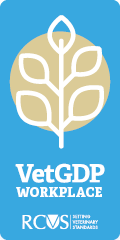Independent vets for over 100 years
We are a proud independent veterinary practice committed to providing quality veterinary care throughout Cumbria.
If you are concerned about your pet or to arrange an appointment please call us on 01900 826666.
To request routine medication for your pet please complete our medication request form.
We have an exciting new logo to mark 25 years
Millcroft Veterinary Group was established in 1999 with the merger of Croft and Millfields Vets who’s independent histories derive from six small practices dating back to the 1920’s. The word group was used at the time to reflect the businesses coming together.
Moving forward we want our logo to represent the independent business that we are, our love of the animals under our care and our unique location. The design is based on the outline of Skiddaw, Ullock Pike and Dodd fells, and the reflection in Bassenthwaite Lake.
New logo but same friendly veterinary team
We are really excited about our new logo but also want to reassure our clients that everything else within the practice remains the same. We are proudly owned by the Directors, all of whom are Members of the Royal College of Veterinary Surgeons, and are vets working to care for your pets and farms, 24 hours a day, as part of the Millcroft Vets team.
We want to thank our loyal clients for your continued support which enables us to remain proudly independent.
